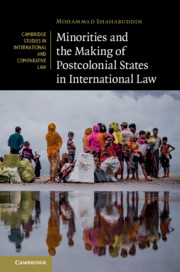Book contents
- Minorities and the Making of Postcolonial States in International Law
- Cambridge Studies in International and Comparative Law: 154
- Minorities and the Making of Postcolonial States in International Law
- Copyright page
- Dedication
- Contents
- Foreword
- Acknowledgements
- Table of Cases
- Abbreviations
- Introduction
- Part I Ethno-nationalism and the Ideology of the Postcolonial State
- Part II International Law and the Postcolonial State
- 3 The Postcolonial ‘National’ State:
- 4 The Postcolonial ‘Liberal’ State
- 5 The Postcolonial ‘Developmental’ State
- Conclusion
- Bibliography
- Index
- Cambridge Studies in International and Comparative Law
5 - The Postcolonial ‘Developmental’ State
Minority Perspectives and International Law
from Part II - International Law and the Postcolonial State
Published online by Cambridge University Press: 21 May 2021
- Minorities and the Making of Postcolonial States in International Law
- Cambridge Studies in International and Comparative Law: 154
- Minorities and the Making of Postcolonial States in International Law
- Copyright page
- Dedication
- Contents
- Foreword
- Acknowledgements
- Table of Cases
- Abbreviations
- Introduction
- Part I Ethno-nationalism and the Ideology of the Postcolonial State
- Part II International Law and the Postcolonial State
- 3 The Postcolonial ‘National’ State:
- 4 The Postcolonial ‘Liberal’ State
- 5 The Postcolonial ‘Developmental’ State
- Conclusion
- Bibliography
- Index
- Cambridge Studies in International and Comparative Law
Summary
Chapter 5 explains how the ideology of the postcolonial ‘developmental’ state relies on the language of economic progress and development to undermine the minority question. I offer a critical, in-depth, and multi-layered analysis of the complex interrelationship between minorities, postcolonial states, and dominant international actors with reference to ‘development’ and international law. The analysis is organised under two major rubrics: I first examine the treatment of minorities in the international law of development and then examine how international law discourse on minority and group rights addresses the issue of economic development. In both cases, critically engaging with central themes in the discourse on both ‘development’ and ‘minority rights’ under international law, I argue that international law provides a framework within which international actors and postcolonial states suppress minority interests in the name of economic development and that politically marginalised minorities suffer the most due to such development activities. In this way, international law involvement in the ideological function of the postcolonial ‘developmental’ state not only results in further marginalisation of already vulnerable minorities but also serves to legitimise and gloss over asymmetric power relations that produce such marginalisation. Case studies on the Rohingya and the CHT hill people substantiate my arguments.
Keywords
- Type
- Chapter
- Information
- Publisher: Cambridge University PressPrint publication year: 2021



